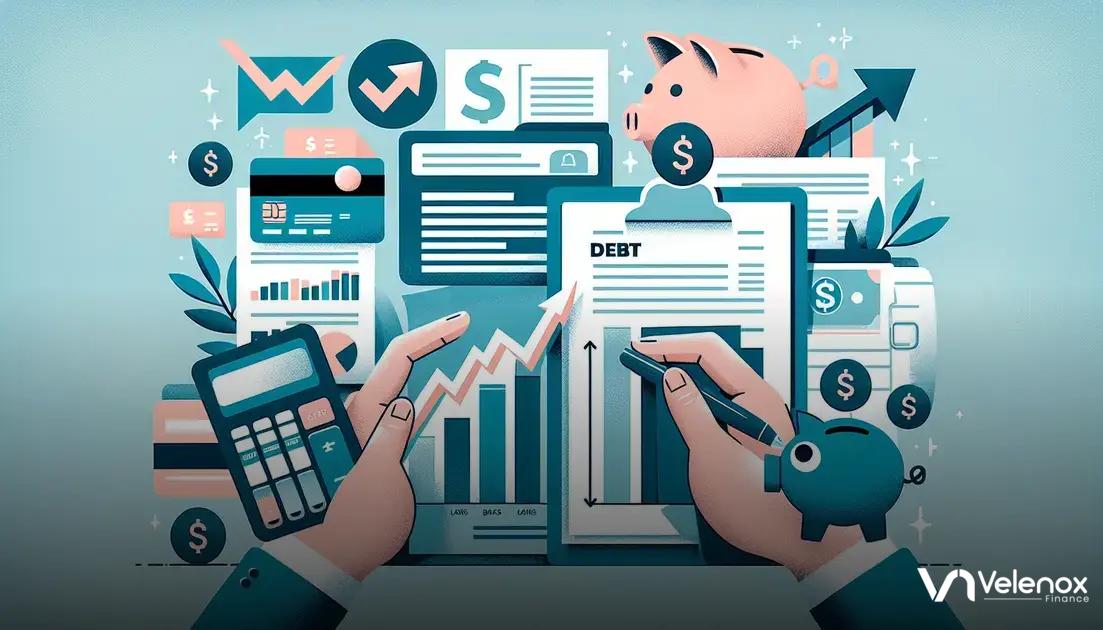Debt consolidation loans provide an efficient solution to those dealing with multiple debts. By merging various obligations into a single loan, you can streamline your payments and potentially reduce your interest rates.
Understanding the ins and outs of debt consolidation can empower you to make informed decisions. Discover the benefits, how to choose the right loan, and common pitfalls to avoid as you consider this financial strategy.
Understanding debt consolidation loans
Debt consolidation loans are a useful financial tool for individuals looking to manage their debt more effectively. These loans allow you to merge multiple debts into one single loan, often with a lower interest rate. By doing so, you can simplify your monthly payments and potentially save money over time.
How debt consolidation loans work
When you consolidate your debt, a lender pays off your existing debts on your behalf. In return, you commit to repaying the lender through a new loan. The new loan typically has more favorable terms, such as a lower interest rate or a longer repayment period, which can ease your financial burden.
Eligibility criteria
To qualify for a debt consolidation loan, lenders will review your credit score, income, and existing debt levels. A good credit score can increase your chances of securing a loan with favorable terms.
Types of debt that can be consolidated
Most common types of debts that can be consolidated include credit card balances, personal loans, and medical bills. However, not all debts are eligible for consolidation. For instance, student loans often require specific types of consolidation loans.
Cost considerations
While debt consolidation loans can provide financial relief, it’s essential to consider any associated costs. These can include origination fees, prepayment penalties, and other charges that may apply. Make sure to read the fine print and understand all the costs involved before proceeding.
Benefits of consolidating your debt

Consolidating your debt can offer significant financial relief and improve your financial health. One of the primary benefits of debt consolidation is the potential to lower your interest rates. By combining multiple debts into a single loan, you might qualify for a lower rate compared to the average rate of your individual debts.
Another advantage is simplified payments. Handling a single monthly payment instead of multiple payments can make managing your finances easier and reduce the likelihood of missing a payment, which can negatively impact your credit score.
Debt consolidation can also help you improve your credit score over time. By paying off your high-interest credit card debt and maintaining on-time payments on your consolidation loan, your credit utilization ratio decreases, which is a key factor in calculating credit scores.
Additionally, consolidating your debt provides stress relief. Knowing that you have a clear plan to pay off your debt can reduce anxiety and help you focus on other financial goals. It offers a structured repayment schedule that encourages disciplined financial behavior.
Potential savings
Lower interest rates and streamlined payments can lead to significant savings over the life of your loan. Calculate the total interest paid on your existing debts compared to a new consolidation loan to understand your potential savings.
Choosing the right debt consolidation loan
When choosing the right debt consolidation loan, it’s essential to consider various factors to ensure it meets your financial needs. One key aspect is the interest rate. Look for a loan with a lower interest rate than your current debts to save on overall interest payments.
Another critical factor is the loan term. While a longer term might result in lower monthly payments, it could also mean paying more in interest over time. Conversely, a shorter term may offer savings on interest but higher monthly payments. Balance these aspects based on your budget and financial goals.
Assess additional fees associated with the loan. Some lenders may charge origination fees, balance transfer fees, or prepayment penalties. Understanding these costs will give you a clearer picture of the loan’s total cost.
It’s also vital to check your credit score as it can impact your eligibility and interest rates. A higher score often secures better terms, so take steps to improve it if necessary.
Comparing multiple lenders and their offers is another effective strategy. Use online comparison tools or consult a financial advisor to make an informed decision. Ensure that the lender is reputable and has good customer reviews.
Finally, consider the flexibility of the loan terms. Some loans offer benefits such as deferment or forbearance options in case of financial hardship. These features can provide added security if unexpected expenses arise.
By carefully evaluating these aspects, you can select a debt consolidation loan that aligns with your financial situation and goals.
Common mistakes to avoid

When pursuing debt consolidation loans, there are several pitfalls you should steer clear of to ensure a smoother recovery process. Firstly, avoid choosing a loan with the highest interest rate, thinking it will be easier to manage. This can often lead to higher total repayment amounts. Investigate multiple lenders and their terms before making a decision.
Another common mistake is not creating a detailed repayment plan. Simply rolling multiple debts into one without a clear strategy can result in continued financial struggles. Make sure you have a concrete plan outlining monthly payments and deadlines.
Moreover, resist the temptation to incur new debts after consolidation. The main goal is to become debt-free, and taking on additional loans or credit card balances can quickly derail your progress. To avoid this, practice budgeting and build an emergency fund for unforeseen expenses.
Finally, thoroughly read all the terms and conditions associated with your debt consolidation loan. Missing a hidden fee or misunderstanding a condition can lead to unexpected costs down the line. Being informed and vigilant about all aspects of your consolidation loan agreement is essential to avoid regrettable mistakes.
FAQs about debt consolidation loans
A debt consolidation loan is a type of loan that combines multiple debts into a single payment. This can simplify your finances and often allows for a lower interest rate and more manageable monthly payments.How does debt consolidation affect my credit score?
Initially, applying for a debt consolidation loan might cause a small dip in your credit score due to a hard inquiry. However, if you make timely payments on your new loan, your credit score could improve over time as you reduce your overall debt.Can I consolidate all types of debts?
You can usually consolidate credit card debts, personal loans, medical bills, and other unsecured debts. However, you typically cannot consolidate secured debts like mortgages or auto loans with a debt consolidation loan.
What are the eligibility criteria for a debt consolidation loan?
Eligibility criteria for a debt consolidation loan vary by lender but generally include a steady income, a minimum credit score, and a manageable level of existing debt. Lenders will assess your ability to repay the loan based on these factors.
Is a debt consolidation loan the right choice for me?
Debt consolidation loans can be beneficial if you have multiple high-interest debts and are looking to simplify your payments and potentially lower your interest rates. However, it is crucial to consider whether you can commit to the repayment plan and if there are any fees involved.





